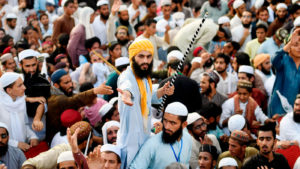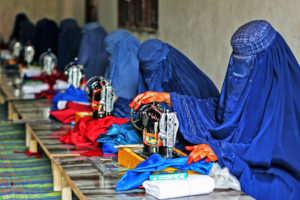My first thought after reading the form to express interest in volunteering at Pakistan’s annual Women’s March was: how many women in Pakistan know what “non-binary” and “cis woman” mean? In a country with a literacy rate of less than 50% for women, who was Aurat March hoping to attract with this questionnaire? Instead of being inclusive, the menu of gender options would probably make a majority of Pakistani women feel unqualified to participate, effectively excluding the aurat from Aurat March. But maybe that was the whole point.
Aurat March is set to take place on International Women’s Day, March 8th, across the country — for the sixth year running. It has been riven with controversy ever since its first iteration in 2018, when slogans like “Mera Jism, Meri Marzi” (“My body, my choice”) caused public outcry, the event being deemed un-Islamic. It’s common to hear Aurat March and the ideology it supports described as “foreign funded”, to advance “Western interests” in Pakistan. Over the years, there have been many accusations that the organisation only represents the first-world problems of the country’s bourgeois class, while offering lip service to the issues of poverty, illiteracy, and domestic abuse suffered by millions of working- and middle-class Pakistani women. Aurat March claims that this is misinformation to discredit the movement.
While it’s not the most sophisticated way of framing the issue, there is a grain of truth in the “foreign funded” claim. Aurat March, and its sister movement Aurat Azadi (Women’s Freedom) March, are progressive Left organisations dominated by Western-educated women who skew heavily upper- and middle-class. Many of these women completed their post-secondary education in the UK or the US, majoring in gender studies, South Asian studies, and political science. Armed with Fulbright and Rhodes scholarships, these “resistance feminists” pick up the rhetoric of anti-capitalist and, ironically, anti-imperialist activism and transport it wholesale to Pakistan. It is these Western progressive orthodoxies fuelling the Aurat March movement. It’s hardly surprising that trans rights — the fad du jour in American colleges — would show up in Aurat March’s communication channels, couched in the language of intersectionality and Critical Theory.
Why bend over backwards to champion the rights of Pakistan’s transgender community (a mere 0.24% of the population), instead of trying to extend an olive branch to the majority of the country’s 220 million citizens, men and women, in language they can understand? In her 2017 book, The New Pakistani Middle Class, Ammara Maqsood argues that, since the Nineties, “progress” in Pakistan has been defined by connections to the outside world. It is only when “an imagined audience, an outsider that needs to be addressed and convinced” believes that Pakistan is modern that Pakistanis will see themselves as modern, she writes. Concerned about how they’re portrayed on the global stage, elite Pakistani feminists want to signal to their comrades in the West: Look, we’re not the backwards and uncivilised country that we seem to be, we believe trans women are women. This tactic seems to be working, looking at the glowing coverage Aurat March gets from mainstream news media in the West, which frames the movement as an “Us versus Them”, zero sum game for which Pakistani feminists are risking their lives. But who exactly is “them”?
The Aurat March would have it that “they” are “radical, Right-wing Islamists”. But the truth is, “they” are the millions of women who — having ascended to middle-class life since the Nineties — reject the idea that modernity in Pakistan must operate in lockstep with the West. These women instead embrace “Islamic feminism” and aspire to be part of the global Muslim community, turning to countries like Turkey for inspiration. They advocate for women’s rights within an Islamic framework, encouraging women to interpret the Quran and highlight the teachings of equality in the religion.
These members of the “new” Pakistani middle class — in contrast to the “old” middle class that came into its own during the sixties and seventies — don’t relate to Aurat March’s narrative about living in an “oppressed, patriarchal” society, because they believe their emancipation lies in applying the wisdom of the Quran to their daily lives. They do not respond kindly to the idea that they need privileged elites to free them from the obligations of caring for their children and in-laws. The “dismantle the family” feminism of Aurat March goes against everything the new middle-class women seek out for themselves: they take pride in being supportive wives, for instance, or attending female-only religious study circles (dars).
Whether Pakistani women turning to the Quran to understand their rights is a good thing is up for debate. But the fact remains that large swathes of educated Pakistani women do not feel that Aurat March represents them or their values, and the March’s leadership has done diddly-squat to change this perception. Instead, the established middle class, whose beliefs Aurat March champions, has been actively hostile towards such women, lumping them in with Taliban-sympathisers, and painting religious-minded critics as being brainwashed by Saudi-style Wahhabism. Accusing those who you claim to speak for of internalised sexism and stripping them of agency is hardly a winning strategy.
Nor is practically ignoring the working-class, rural population of Pakistan. 75% of women and girls are employed in the nation’s unregulated agriculture sector. But in the inter-middle-class battle of Pakistani feminism, working-class issues hardly get any airtime. These are the women who don’t have access to medical care. Hundreds of thousands die during maternity labour every year. Others are subjected to superstitious wedlock, underage marriage, and denied education. Aurat March has little to say about how to help any of these vulnerable women. Slogans to “dismantle the patriarchy” and “decolonise gender” don’t do much to affect real change.
But if Aurat March were to abandon this language, and incorporate terminology and manifesto demands more in line with the growing Islamic feminist movement in the country, its international brand would be irreparably damaged. Fighting for environmental justice, demanding to defund the police, and putting transgender politics at the centre of one’s activism — all part of Aurat March’s 2022 manifesto — is much more palatable to readers of the New York Times than engaging in “backward” practices like debating what rights women have in Islam. If Pakistan’s elites dared do such a thing, the West would write off the nation as another “shithole country” overrun by Islamists. Feminism’s status as a “luxury belief” would fall away — and so too would the Pakistani elite’s sense of itself.
As Maqsood writes in her book, it is from “a global stage which recognises only the language of development… that the progressiveness of the established groups becomes imbued with a moral purpose that distinguishes them from other classes”. In the absence of economic factors separating the old middle class from the new, their own sense of moral superiority is all that Pakistan’s elites can cling to. It’s why Aurat March only wants volunteers who will list their pronouns in their bios, and have no qualms about excluding millions of women from their vision of feminism. By this point, it doesn’t even matter what their 2023 manifesto demands are (I wouldn’t be surprised if self-ID is a prominent topic) — Aurat March has alienated most of the population, and seems uninterested in winning them back. As one representative tweet argues: “So many amazing feminist organisers I know have distanced themselves from Aurat March, which is fair, but also alarming. The march organisers need to be able to take criticism, esp if its coming from those who’ve supported them from the beginning.”
Judging from their volunteer form and most recent social media activity, Aurat March is comfortable with its solid position on the “lifestyle Left”. It promotes questions of identity, consumption, and moral attitudes over tradition and community. The annual event has become nothing more than an exercise in intellectual gatekeeping: a reminder to the upwardly mobile masses that the definition of modernity in Pakistan is a way for the established elite to preserve their dominant position in society. There is no room for either the new and growing middle class, or concern for the working-class women who can’t even read — let alone win a Rhodes scholarship.
Disclaimer
Some of the posts we share are controversial and we do not necessarily agree with them in the whole extend. Sometimes we agree with the content or part of it but we do not agree with the narration or language. Nevertheless we find them somehow interesting, valuable and/or informative or we share them, because we strongly believe in freedom of speech, free press and journalism. We strongly encourage you to have a critical approach to all the content, do your own research and analysis to build your own opinion.
We would be glad to have your feedback.
Source: UnHerd Read the original article here: https://unherd.com/



